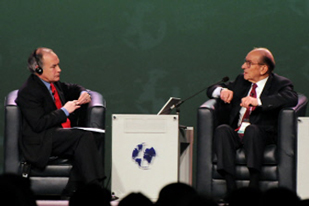
Saudi Arabia dwarfs other states in the region and analysts say there is concern that a common currency would serve to concentrate power in Riyadh
A project to establish a common currency for the Gulf has been dealt a near-fatal blow with the decision by the United Arab Emirates to abandon monetary union after disagreement with Saudi Arabia over the location of a future central bank.
The loss of the Emirates to the currency project could accelerate decisions within some Gulf states to diverge from Saudi Arabia’s desire to maintain a currency peg with the dollar. This could lead eventually to the UAE, the Gulf’s most sophisticated economy, floating its dirham, analysts in the region said.
The UAE attributed its decision to quit the Gulf Cooperation Council (GCC) project to the choice of Saudi Arabia as host of the key monetary institution.
Evidence of mounting rivalry and distrust between the Gulf’s two biggest economies emerged two weeks ago, when a meeting of the GCC voted to locate the central bank in Riyadh. UAE officials expressed reservations about the decision. The choice of Riyadh would enhance the physical presence of Saudi Arabia within the GCC, as the organisation’s secretariat is already headquartered in the Saudi capital.
The UAE is the second state in the six-member GCC to pull out of the common currency, which was due to be launched next year. Oman had said already that it would not take part, but the loss of the Emirates, which has the greatest international trading links, makes it unlikely that the project will get off the ground.
Read moreUnited Arab Emirates exit leaves Gulf currency plan on brink of failure
